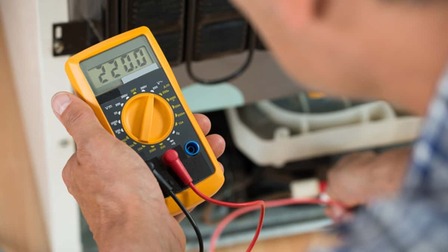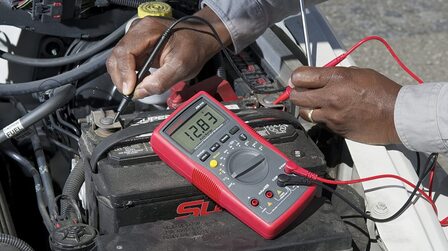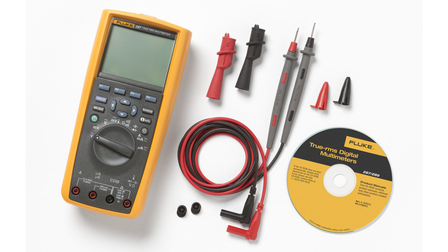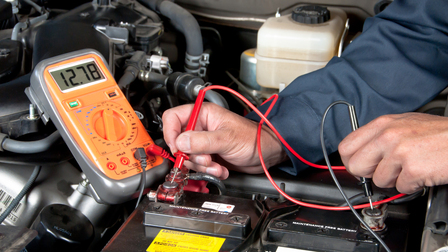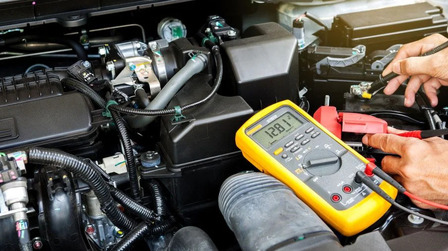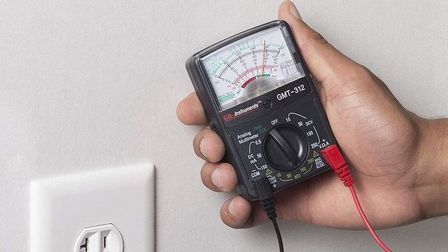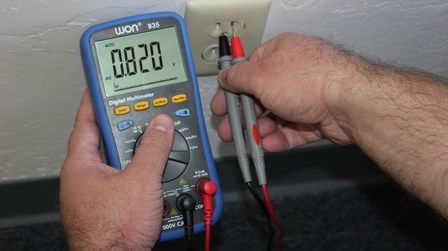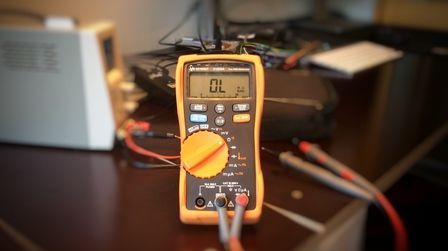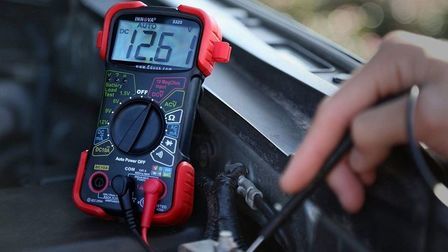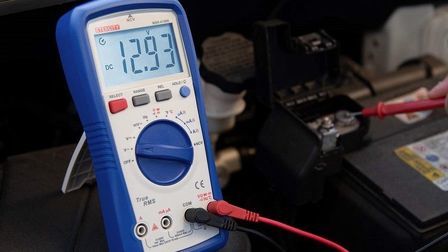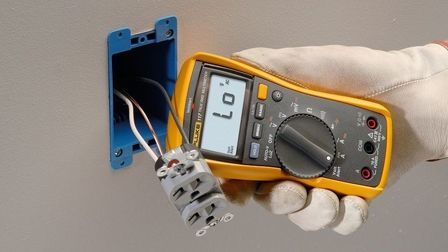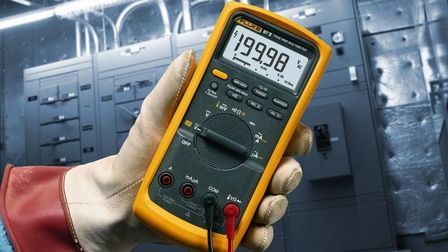Once in a while, things in the house and garage start to function abnormally or appear to stop working altogether.
Fortunately, with the invention of the multimeter, even the average homeowner can now diagnose issues with their electronic possessions.
Multimeters are mostly used as diagnostic tools to help homeowners, car owners, and DIY workers get a read on what kind of energy their electrical objects are producing.

They are mostly used to correct issues in the home and with vehicles, but they can also be used to install wiring, fuses, and circuits too.
In order to find the best multimeter for your needs, it’s important to assess what you will be using it for before you begin to do a few product comparisons.
What is a multimeter?
Multimeters were designed to give accurate measurements for current, voltage, and resistance to help determine what your electrical device is producing.
In addition to that, they can also be used for transistor, continuity, and diode testing on household and automotive items.
Some of the things that a multimeter can be used on include electrical outlets in the home, automotive circuits, fuses, batteries, wires, and battery charging systems.
They can also be used to build and repair all kinds of circuits.
Components of a digital multimeter

The basic components of a digital multimeter include:
- A Battery
- Switch
- A/D converter
- Digital Display
- Digital Controller
- Input Signal Conditional and Converter
While some multimeters will have more parts to them, nearly all of them have the ones mentioned above.
Each model and brand design have slightly different features, which is why some multimeters seem to be more equipped than others.
Learn more:Best Multimeter For Homeowners & Beginners
What are advanced functions of a multimeter?
Some of the more recently developed multimeters come with a set of other advanced functions including but not limited to Bluetooth readings, temperature readings, compatibility with smartphones for a second screen, a high-quality graphical display and expanded capabilities.
These premium features are fantastic for ensuring accurate information and also to promote safety for getting reads that might be in high or difficult to reach places.
Different types of multimeters
There are several different types of multimeters out for sale, and it is up to the user to determine what sort of product will best suit their needs.
The two main kinds of multimeters are analog and digital models, but there is an array of other ones as well.
Below are descriptions of what you can look for when it comes to different multimeter products in stores or online for purchase.
Analog Multimeters
Analog multimeters were the first kind of multimeter ever made, and a lot of people like to use them because of their simplicity and the fact that they are cheaper.

Despite this, analog multimeters are also harder to read since they give their readings via a needle on the display.
When shopping for an analog multimeter, it’s important to make sure that the device has a high sensitivity, because otherwise, it might give the user inaccurate results.
However, some of the other benefits of an analog multimeter include the fact that they don’t require a battery for use and the live needle can show you inconsistencies in the readings in real time.
Digital Multimeters
Digital multimeters are the most common type of tool on the market these days. They are known to be more accurate than analogones, however, they aren’t the best type of multimeter for measurements that are constantly changing all the time.
This is because there is a slight delay in readings, as digital multimeters have to initially take in the data as analog data and then convert it.
Digital multimeters are almost always battery powered, and this means that their display screens are brightly lit up and easy to read.
There are actually several kinds of models, so you will have to do some research to see what is the best digital multimeter for your needs.
Fluke Multimeter
Fluke multimeter devices are another type of digital multimeters. These are different than regular digital multimeters because they are designed to perform various collaboration functions and typically have very big display screens.
In addition to that, Fluke multimeters are able to be used for measuring electrical resistance and voltage.
Some Fluke multimeters even come with certain advanced features that can measure humidity, pressure, frequency, temperature and duty circle.
Clamp Digital Multimeter

Clamp digital multimeters come with the specialty of measuring the flow of electricity.
They do this by means of the “clamp feature” which measures the amps as the probes calculate the volts.
Clamp multimeters also come with a wide variety of settings so that the user can decide which one is appropriate to use for any given project.
Read more: How to Choose The Best Clamp Meter?
Autoranging Multimeter
Autoranging multimeters are known to be some of the most user-friendly versions out there, but they are also one of the most expensive digital types.
They also have fewer positions to switch on the central knob, taking a lot of the decision-making out of using this tool for the user.
Automotive Multimeter
Automotive multimeters are tools used to diagnose problems in vehicles as well as measure their electrical properties.
Some of the different things that a user can assess in a car with one of these multimeters are its resistance, current, and voltage.
These are very important devices for people who wish to fix their own car when it’s experiencing issues.
In addition to that, having a multimeter for your garage can be extremely handy as it replaces the number of meters you would need to get different reads on your vehicle.
Read more: Best Automotive Multimeter For The Money
HVAC Multimeter
A large percentage of homeowners have an air conditioning system installed, which is why it’s a good idea to keep an HVAC multimeter on hand in case things go awry.
They are also great assistants for HVAC techs, as they are frequently used to determine what the problem is with someone’s HVAC unit.
Specifically, HVAC multimeters can be used to troubleshoot systems accurately and easily.
How to Choose the Best Multimeter?
When it comes to choosing the right multimeter for your needs, it really depends on what you would use it for and how often it would be employed.
There are so many good multimeters out there, it’s just a matter of doing a little comparison between models to see which type functions the way you want it to.
Firstly, understand the tool
Merchant websites are a great place to find product reviews, and going to the hardware store to talk to employees about multimeter options are two ideas on how to learn more about these handy tools.
Know what types of multimeter are best for your need
All kinds of people use multimeter tools, from the average homeowner to the professional electrician.
There are plenty of different kinds of multimeters out there to suit the needs of any kind of user.
For example, a commercial electric multimeter may be perfect for the construction worker that has to use it on a daily basis, while the occasional user might be better fit with a pocket multimeter.
For the DIY worker, a cheaper and less complicated multimeter such as an analog model might be an ideal purchase.
Whereas an electronic technician who works in an industrial field would consider a digital multimeter with more advanced features to ensure their safety on the job.
The fact is that some multimeters are designed for more continual use than others, which could be a big draw to buying a certain kind.
Read more:Best Multimeters for Electronics Hobbyist
Consider which multimeter features are required
Some of the features that everyone should look at before buying a multimeter include whether or not an analog multimeter would suffice, if a digital multimeter with advanced features (like Bluetooth) is needed, and if the user needs a multimeter to get readings from either a home, automotive, HVAC unit.
Automotive multimeters are generally bought when someone wants to run some diagnostic tests on their car, and HVAC multimeters are for those who work on A/C units or want to check their system at home.
In any case, it’s important to narrow down which multimeter features are key before a purchase is made.
Which are the best multimeter brands?

There are many types of manufacturers out there, but some are more popular than others. Some of the best multimeter brands are:
- Fluke
- Craftsman
- Mastech
- Extech
- Klein
- INNOVA
How to Use and Maintain a Multimeter?
Caring for your multimeter is important so that it lasts a long time without getting broken or needing repairs.
Also, it’s wise to be informed on how to use these tools safely.

Below are some tips to help all multimeter users with these two things:
- Always be sure to use the correct jacks to protect your multimeter from being exposed to too much voltage
- Prior to using your multimeter, double-check that the settings are correct. This can prevent you from seriously damaging the battery and the meter
- After you finish using your multimeter, be sure to put it away in its correct case and location. Storing it in the wrong location for easier access might cause it more damage in the long run
- Always be sure that the device you’re measuring isn’t too powerful for your multimeter
- Always inspect your multimeter before and after you use it for signs of physical damage
- Once your multimeter is in the jack, test it to ensure it’s in there securely
- Never use a damaged test probe. If you see that yours is broken or damaged, purchase a new replacement
Frequently Asked Questions about Multimeters
1 - What is the difference between a multimeter and a clamp meter?
A regular multimeter is a tool to measure voltage while a clamp meter measures current. Although the two have separate primary functions, they can also share some other measuring abilities.
2 - How do auto-ranging and manual ranging multimeters compare?
With a preset manual multimeter, the user has to work within a set of defined fields for measuring ranges of value for the resistance, voltage, and capacitance.
If you have an auto-ranging multimeter, it does the assessment and sets the range for you.
3 - What is the true RMS multimeter?
A true RMS multimeter is able to measure alternating current or AC voltage. Not all multimeters measure RMS.
4 - What is the safety rating for a multimeter?
Multimeter tools are fairly safe to use as long as the operators pay attention to the instructions that come with it.
Since these devices come in contact with electricity, it’s important to use them as directed. Most multimeters have a category rating of either CAT II or CAT III.
5 - What kind of a multimeter should a first-time user get?
It’s hard to know what someone’s motivation or needs would be when it comes to choosing a multimeter to buy, however, for general use, it’s hard to go wrong with a standard digital multimeter.
Even though they are a little more expensive, they are much easier to read and use for measurements.
6 - Which multimeter is good for testing everything electrical?
Unless you’re trying to work with a specific type of home or automobile device, a digital multimeter works best for most things.
7 - Are all digital multimeters the same?
No. Many digital multimeters share the same features and functions, however, there are many models with specific uses (i.e. for HVAC or automotive).
Conclusion
There are many different kinds of multimeters on the market, but the key to finding the one that you need for your work or home projects is to assess what features are most important amongst all the models.
Generally speaking, the best multimeter for most people is a simple digital meter.
However, if you are in looking for a design that can perform a specific function, there are many multimeters out there that have been tailored to do just that.
Always be sure to review different models online before making your purchase.

